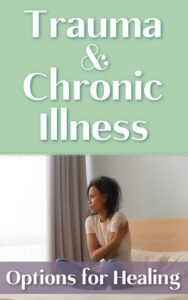The Trauma of Chronic Illness: An Important Consideration
Trauma and chronic illness are closely linked in a variety of key ways.
linked in a variety of key ways.
While trauma can cause chronic illness, chronic illness can also cause trauma.
Here we will explore what trauma is, the mental, emotional, and physical effects of trauma, how chronic illness can cause traumatic effects, how trauma itself can contribute to chronic illness, and how to address and heal from trauma overall.
Some of the links in this article are affiliate links. This means that if you click the link and subsequently make a purchase on the merchant’s website, we may earn a small commission at absolutely no additional cost to you. All opinions are entirely my own. I have used all products mentioned personally for years.
What is Trauma?
Trauma can be defined as the resulting mental, emotional, and physical effects from a set of circumstances, event, or series of events that are experienced as physically or emotionally harmful, threatening, disturbing, or distressing.
Examples of traumatic events include:
- Abuse – physical and/or mental/emotional
- Sexual assault
- Natural disaster
- Death of a loved one or similar such loss
- Accidents such as a car accident
- Illness – acute and/or chronic
- Surgery
- Serious injury
- War
- Sudden and unexpected life changes such as losing a job, ending a significant relationship, etc

There are 3 main types of trauma which include:
- Acute – a single event
- Chronic – prolonged, repeated events and experiences
- Complex – similar to chronic trauma, this is the repeated exposure to traumatic events over longer periods of time. Complex trauma is more often experienced by a child as a result of being abused by a trusted individual such as a parent.
The form of trauma that is most often experienced as a result of chronic illness is chronic trauma to varying degrees.
Much more on the subject of chronic illness (definition, types, causes, etc) can be found here.
Trauma can be physical (such as a surgery, car accident, injury, exposure to environmental toxins, etc), and mental/emotional (abuse, neglect, loss, etc), or both, as is most often the case experienced with chronic illness.
As previously mentioned, the topic of trauma is also linked to chronic illness in that trauma can cause chronic illness.
It is an interesting causal relationship, as chronic illness can cause trauma, and trauma can cause chronic illness.
This close connection is explored further below.
The Mental and Emotional Effects of Trauma
Trauma can have a far-reaching impact on our comprehensive well-being and quality of life.
This is particularly apparent in regard to the mental and emotional effects of trauma.
Feelings that are often experienced as a result of trauma are:
- Fear, often extreme
- Hopelessness
- Sadness/depression
- Horror
- Powerlessness
- Suffering
- Pain
- Confusion
- Overwhelm
- Intense worry and uneasiness
- Anxiety/nervousness
- Emotional numbness/feeling empty
- More
Furthermore, trauma has a notable impact on one’s thinking patterns. Thoughts can become more negative as a whole, as they are centered more and more on the traumatic experience and the feelings of suffering associated with the trauma.
Trauma often catalyzes a notable state of anxiety, uneasiness, and feeling of heightened vulnerability.
It is important to note that everyone experiences trauma a bit differently. While some people experience trauma as having very intense, heightened emotions, some may also experience a feeling of emotional numbness or emptiness.
Trauma causes us to exist in a state of survival, which can cause racing thoughts, fear, worry, and similar such thoughts and feelings.
The Physical Effects of Trauma
As is becoming increasingly more well known, stress has a very adverse impact on our physical health, as our mental and emotional health is intimately linked to our physical health and vice versa.
Trauma is essentially an extreme state of stress.
This heightened state of stress adversely impacts the nervous systems, gene expression, brain function (as the limbic system in the brain is triggered and goes into a heightened state of alarm which has a cascade effect on many systems of the body), immune system (ingniting a state of chronic systemic inflammation), hormone imbalance, and more.
As a result of these far-reaching physical effects, most forms of chronic illness have the potential to arise due to the influence that trauma has on the body.
Furthermore, some of the physical symptoms that can develop as a result of trauma include:
- Chronic fatigue and extreme exhaustion
- Insomnia
- Night sweats
- Heightened sensitivity to sound and light
- Brain fog
- Heart palpitations
- High blood pressure
- Chest pain and/or tightness

- Shortness of breath
- Digestive upset
- Nausea
- Decreased nutrient absorption
- Changes in appetite
- Hormone imbalance (thyroid, adrenal, sex hormones, etc)
- Autoimmune conditions
- Weight fluctuations
- Arthritis
- Chronic pain of all kinds
- Much more
The Silence Around Trauma and Chronic Illness
While the subject of trauma and its effects is gradually gaining more traction within our society, the potentially traumatic effects of chronic illness are rarely discussed or given due attention.
Oftentimes, so much attention is being put on healing from the actual physical illness, that addressing the potential trauma of the overall experience of chronic illness is left out of the equation.
This is a key factor within the overall picture of chronic illness that must be addressed as part of one’s healing protocol in many cases.
How Chronic Illness Can Contribute to Trauma
Experiencing chronic illness, especially severe chronic illness, is a multifactorial circumstance that can have many different effects on someone’s life. One of these effects is trauma.
There are many ways that the experience of chronic illness can potentially cause a traumatic effect. Some of these include:
- The symptoms themselves
One of the more obvious potential causes of trauma is experiencing the symptoms themselves – physical and/or mental/emotional symptoms such as anxiety.
The symptoms associated with chronic illness can be many, and often severe. It is not uncommon for someone with a severe chronic illness to experience upwards of 60 or more symptoms every day, all at once.
This can be a very challenging and often traumatic experience to go through, as these symptoms are extremely uncomfortable and can be frightening at times.
I have a few personal examples…
There have been a number of times in my lengthy journey where I genuinely questioned whether I was going to make it through this. The pain was so incredibly severe I had questioned on numerous occasions if it was life threatening.
I’ve also experienced such severe shortness of breath at times that I didn’t know if I would wake up after falling asleep that way.
There were other times when I would be walking or standing and this overwhelming sense of dizziness and illness would overcome me. It happened at home plenty of times but also in public, while walking in a parking lot for example.
I would start to feel nauseous and my hearing would go out. Then I would feel incredibly dizzy, light headed, and my legs would become very weak as if they were going to give way at any moment. I would have to brace myself on various objects such as the shopping cart, a counter, etc to stumble to the closest area to sit down. My face would become white as a ghost and my skin would become sweaty.
These “episodes” would come on very suddenly and would last for about 45 minutes to a couple hours.
I’ve also experienced an anxiety/panic symptom before that was to such a high degree it felt like an out-of-body experience. It was level 10 panic, with an incredibly intense sense of impending doom.
- The potential incredulousness from the people in one’s life
Often, one of the biggest challenges for those who have a chronic illness is to try to convince those around them that they are actually sick.
There are many shapes and forms of chronic illness (explained further here), and it is very common for someone to be suffering from a severe chronic illness and have absolutely no outward physical indications of such. That is, they may not physically appear to be sick at all.
Someone’s outside physical appearance has absolutely nothing to do with whether they are truly ill, which can lead to a great deal of confusion for many people. These such people are incredulous because they think someone must look sick to be sick, when in truth that is not the case at all.
This can be extremely challenging and have a potentially traumatic effect on the individual with the illness. This is due to the fact that they are personally experiencing something that is very very real…their whole life may be impacted by their array of symptoms, yet those around them don’t believe in the veracity of their illness or circumstance.
This can lead to strong feelings of isolation, frustration, and sadness.
As a note, throughout my own journey, I found that once I digested  the fact that my own understanding was the most important factor, it no longer mattered to me what other people said or thought about my situation. It isn’t their journey to understand, it is mine.
the fact that my own understanding was the most important factor, it no longer mattered to me what other people said or thought about my situation. It isn’t their journey to understand, it is mine.
After you explain your state of health and your circumstances to someone, it isn’t up to you to try and convince them that what you explained is the truth.
This realization was super liberating for me, and allowed me to focus on my own healing without feeling hurt and bogged down by the misunderstandings of others.
Much more on this topic can be found here.
- Social isolation
The circumstances surrounding chronic illness can often have a marked influence of one’s relationships and social life in many different ways.
Often, the symptoms associated with chronic illness such as extreme fatigue, chronic pain, etc will prevent the individual from partaking in the activities that were once a major part of their life – social gatherings, vacations, outings with friends and family, holiday festivities, etc.
They are often spending much more time at home, and a lot more time by themselves or around fewer and fewer people.
This can be traumatic in that it causes one to feel extremely isolated and often very lonely. When this goes on for extended periods of time, often many years, this traumatic effect can become more pronounced.
- Dramatic and sudden life changes
As a result of chronic illness, the individual may have to make various sudden and dramatic life changes.
These changes may include withdrawing from school, leaving a job, moving out of their own home and in with friends or relatives, and more.
These changes can have a traumatic effect because they can be very distressing and contribute to strong and lasting feelings of worry over one’s livelihood, financial security, future, and basic means for survival.
- Unanswered questions, lack of definitive treatment guidance, etc
It is very common for those experiencing chronic illness to see a wide variety of different doctors, only to be left with a plethora of unanswered questions regarding their illness and little guidance as to how to properly heal.
This is very distressing for the individual, regarding both the “mystery” of why they are so ill and henceforth the lack of a healing plan and idea of how to improve their current state of ill health.
This can lead to strong feelings of uneasiness, frustration, and anxiety about their well-being and their future and deep concern as to how or when they will be able to heal.
The Profound Necessity of Successfully Healing From Trauma
When trauma isn’t healed correctly, it can have very notable long term adverse effects on one’s life in many ways.
All of the above mentioned mental, emotional, and physical effects can develop and stick around long term.
Furthermore, unhealed trauma can cause anxiety, depression, Post Traumatic Stress Disorder (PTSD), Obsessive Compulsive Disorder (OCD), and many forms of mental illness.
It is key to process and heal trauma as part of one’s comprehensive healing process, so as to ensure that the mental and physical effects of trauma do not adversely impact the individual long term.
It is also important as part of one’s comprehensive healing plan to address the processing and healing from any potential past traumas as listed in the first section of this article. These such traumas may be contributing to the illness that is currently being experienced, so addressing them as part of the healing process is required for total and lasting healing.
Most integrative and functional health modalities will address mental and emotional health and healing as part of the Whole Person healing approach. This is explained further here.
Trauma Healing Tools and Finding Support
There are a variety of effective tools that can be utilized as part of your trauma healing approach. These are effective healing tools whether your trauma was caused by your experiences with chronic illness, or your trauma is causing your chronic illness.
These tools include:
-
Trauma Counseling/Therapy
It is incredibly important when going through any type of challenging situation to be able to express your thoughts and feelings. This is a key component of processing trauma to be able to grow and heal through the experience.
One of the best ways to do this in a structured, healthy way is to seek out the help and support of a trained therapist. This provides a safe, supportive, confidential space for you to express yourself, organize your thoughts, and process your feelings.
provides a safe, supportive, confidential space for you to express yourself, organize your thoughts, and process your feelings.
Seeking out a therapist who is specifically well-versed and experienced in trauma counseling and/or chronic illness counseling is important as well.
Most therapists will include their specialties in their main advertising or bio on their website. If not, you may contact their office to inquire if they have experience and specialty in trauma counseling.
Seeking out the support of family and friends is also of course welcome, however It is important to remain aware of the fact that people in your life may have the best intentions, but a trained professional therapist will be equipped with tools and resources that will be able to aid in your emotional healing and processing the most successfully.
This isn’t to say that the support of your family and friends isn’t a wonderfully valuable part of your life and your healing, because it truly is, of course. But it is to say that there are components to healing from trauma that require the help of a trained professional and utilizing this form of support is important.
It is key to be aware of the fact that trauma is a delicate topic and takes a particular finesse to work through and manage. Even some therapists may have the best intentions, but go about trauma counseling in a way that can re-traumatize the patient.
This is one of the reasons that finding a therapist that specifically specializes in trauma is key.
Moving into the trauma healing arena with the general awareness that your case is unique to you and that you deserve conscientious, professional, aware care is helpful so as to grant you the most appropriate and truly healing therapeutic space.
If you don’t feel comfortable for any reason with a therapist, by all means look for a different one. It is very important to feel truly supported, safe, and comfortable with your particular therapist. This is huge for your successful healing and for your well-being in general.
Some of the titles that appropriate trauma counselors or therapists can have are:
-
- Licensed psychologist
- Licensed clinical social worker
- Holistic psychologist
If finances are a deterrent for you in seeking out the aid of a professional therapist, there are some options. Some therapists will charge on a “sliding scale,” which means they will reduce their fee to better accommodate your current financial situation. Always ask a potential therapist if this is something they offer.
If you have health insurance, a list of therapists that are covered within your current health insurance plan can also be accessed by contacting your health insurance provider.
It is incredibly important to process trauma so as to heal from it successfully, and utilizing the help of a trained therapist is an excellent way to do this.
-
Dynamic Neural Retraining System (DNRS)
DNRS is a highly effective way of healing from mental, emotional, or physical trauma. It involves rewiring the limbic system in the brain via applied neuroplasticity, so that the body is brought out of the chronic stress state and back into balance.
This henceforth heals the physiological effects of trauma.
Limbic system retraining involves a minimum of 6 months of daily exercises, a shift in cognitive associations, and more.
It is an online program that involves a self-paced initial instructional period, then the independent application of the  exercises and tools presented.
exercises and tools presented.
I have personally done this program and am still actively engaged in it.
DNRS can be used as a healing tool for trauma of any kind, for various chronic illnesses themselves, and/or a combination of both.
DNRS is also an awesome part of an effective healing protocol for Biotoxin Illness from mold exposure. Mold exposure can ignite a physical trauma response in the body, which causes limbic system imbalance and a cascade of physiological effects.
These effects can include “multiple chemical sensitivity,” brain fog, anxiety, depression, chronic fatigue, and a whole host of other effects and symptoms.
The DNRS program has been one of the most effective tools that I have used throughout my healing journey and one of my most valuable investments.
The effects are experienced over time for most people. After about 3 months doing the program, I noticed a dramatic decrease in my severe sensitivity to chemicals. This is still improving each day.
DNRS has also helped in reducing the symptom of anxiety considerably.
My energy levels have continued to improve and I also experienced a notable decrease in brain fog and began to feel generally more alive.
These improvements have all of course been truly welcomed throughout a long journey of healing.
Click here to check out the program.
If you have any questions regarding my experiences with this, feel free to reach out! You can comment below, email me directly at megan@healingjourneyessentials.com, or you may submit the form on our contact page :).
Also, an extended exploration of the program and my experiences can be found here.
-
Emotional Freedom Technique (EFT)/”Tapping”
“Tapping,” also referred to as the Emotional Freedom Technique is a wonderful tool to use as part of your trauma healing approach.
This technique involves tapping your fingertips on specific meridian points (located on your head, face and upper torso) on your body while stating certain phrases relating to your traumas and your associating thoughts, feelings, and experiences.
This process helps to calm the stress response in association with the experience you are “tapping” about. This can help relieve anxiety and help to facilitate a healthy emotional processing of the event/topic.
I have been utilizing tapping for many years and absolutely love it.
It is an easy, very convenient way to move through life’s challenges and disallow them from adversely impacting you in any notable way.
Nick Ortner is the founder of “The Tapping Solution,” and has done a great deal of wonderful work in this field. His introductory book “The Tapping Solution: A Revolutionary System for Stress-Free Living,” is a great resource to use to get started.
I have found that a combination of trauma counseling, DNRS (as explained above), and tapping have been the most effective combination for trauma healing for me. The additional tools described below have also been helpful.
My own personal trauma healing journey has involved healing from past traumas as well so it has been most beneficial to utilize multiple techniques for the most effective and lasting healing.
-
Additional tools

Another very helpful tool when healing from trauma is gentle physical movement such as yoga, stretching, and walking. Walking or just being in nature in particular can be very relaxing and soothing to the nervous systems.
Always only do what you are physically capable of, and if you aren’t capable of much physical movement, then opening your window or doing arm stretches are also helpful.
Journaling is also a wonderful way to organize your thoughts, express your feelings, and promote emotional processing, and is a great addition to your trauma healing approach.
In Closing…
As we’ve explored here, trauma and chronic illness are very closely linked and have causal relationship.
Addressing trauma is a very important element to consider in the healing process, however it is frequently disregarded or not addressed at all.
If you or a loved one are currently experiencing the challenges associated with chronic illness, I have such deep empathy for you and send you lots of love. There is a light at the end of the tunnel, and you will heal.
Be tender with yourself as you move through this experience.
Your future is so bright and amazing things are ahead 💜.

REFERENCES